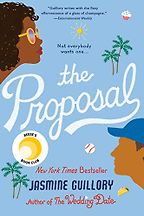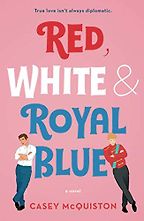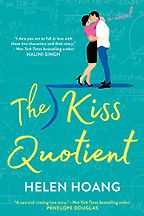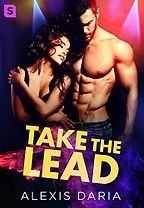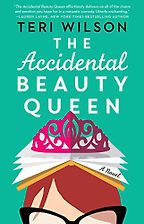It’s May 2019 and you’ve kindly chosen the five best romance books of the past year for us. Before we talk about them individually, can you tell me what links these books together? What makes a good romance novel?
The main thrust of a romance novel is the happily ever after of the main characters. The central plot is that the couple in question gets together, whatever their path is. It could be an easy ride, it could be a difficult ride, as long as they get together in the end.
The romance books that I’ve specifically selected have diverse characters. There are also strong family themes going on in all of them. And they have pretty strong (female) relationships among the secondary characters.
What age did you start reading romance? Have you always been a huge fan?
It’s funny you should ask that because I actually fell into romance through work. There was a need in the community that had to be filled. I’d been an adult reference librarian for almost 20 years at a local public library in Long Island, New York. The romances in the collection hadn’t been really checked on in a while. There were complaints that we didn’t have enough variety, and when a certain high demand title hadn’t been ordered at all, my director wanted to have somebody in there to focus on the genre. As librarians, we can be spread out very thin with the day-to-day operations. You don’t really know which parts of your collection work unless you’re keeping an eye on all of it cohesively. So he put me in that role.
I was no stranger to romance in terms of, when I was a teenager, I would take books off my mom’s shelf—and my friends’ moms shelves—and read the passages we weren’t supposed to. I’d go to the romance section of the local drugstore and flip through the ones with Fabio on the covers, that kind of deal.
But really my passion for romance started when it was assigned to me as a project at work. I ended up falling in love with it as a genre, right alongside our patrons in terms of discovery. I had to read for work, of course, and I was building the collection for the community, but I started to gravitate towards certain subgenres that I personally really loved, too.
Is it one of the most popular genres at your library?
Oh yes, absolutely. You can’t always tell who those readers will be, but what happens with romance is that the readers that come in know who or what they’re looking for. Or, historically, they would come into the library to discover new authors or a re-discover a favourite’s backlist and then they would buy through those authors.
But now, with Amazon and Kindle Unlimited, BookBub and Prolific Works, you can get titles or read for free. There are promotions, like first-in-series offers to entice readers. There are also lots of Facebook groups, Advanced Reader Copy Clubs, Author Street Teams (where authors get their readers/volunteers to promote titles via word-of-mouth and their own social media) that kind of thing. Even a library’s own eReading or audio app. All of this helped change the landscape of how readers purchase.
The library is still that place for initial discovery, rather than, okay, ‘I’m going to discover this author here and then buy through all of their stuff.’ They’re not really doing that as much as they used to, in my experience, though I can’t speak for all public libraries. I can only speak for my own experiences with readers. Librarians need to recognize that patrons need those books to be on library shelves or they are going elsewhere. Because readers know they do have the options to find them elsewhere.
“Most are coming to romance novels because there’s sex”
Romance is super popular. And you’ve got to keep an eye on those circulation records, certainly on the digital side, because you don’t see patrons/readers unless you really want to get to know them, what appeals to them. They come in, they select what they want, and then they leave. But my readers came to know me as somebody who was specializing in romance, with purpose. They would come and talk to me and we’d get into these hilarious discussions at the desk. I had a couple of men as well and it’s been really a great ride.
All the books you chose are all by women. Women seem to be the dominant authors in romance, but are they the dominant readers as well?
They are, I have to say. But that’s changing. And there are a few male authors who write romance, too.
You mentioned reading the parts of romance books you weren’t supposed to when you were a teenager. I haven’t read all of the books on your list yet, but they’re quite racy, aren’t they?
Yes. Not The Accidental Beauty Queen, which has what’s called a “closed door” scene. But yes, they’re racy: that so goes on in romance.
So that’s not just your personal preference: that’s the direction of the genre?
You have to accept that that’s a huge part of romance and a huge draw. It moves the plot along and gets the characters together. Some people do come to romance looking for—this is a term that people don’t love to use anymore but readers use it, so I’ll call it this here—the ‘cleaner reads’. But most are coming to romance novels because there’s sex. The sex represents the same thing as the couple’s first kiss together. It drives the plot in a specific way to what’s expected for romance as a genre.
Let’s talk about the individual books now, these five books you’ve chosen as the best romance books published in the last year, so from 2018 to 2019. Have you put them in order of preference?
No, because they’re all really excellent. I just wrote down whatever came to my mind first.
I’m at a reference desk; I’m reaching that reader and I only have a couple of minutes with. That’s really how I came to how I discuss books. I try not to give plot away too, too much—just the general outline. You’re there to discover that book for yourself. Then I hope you’ll come back to discuss why you loved it, or even why you didn’t.
OK so let’s talk about The Proposal by Jasmine Guillory first. On the blurb it says it was a New York Times bestseller and a Reese Witherspoon Hello Sunshine book club book. It’s got a great opening scene. Why have you chosen it for your list?
I really did pick it because of that opening. I’ve never seen or read anything like it before, this surprise proposal via jumbotron at Dodger Stadium. It goes spectacularly wrong. It’s not meant to be funny—you’re kind of shocked, actually, and a little worried about Nik, who is the heroine. This guy proposing, Fisher, spells her name wrong; he didn’t really discuss any intentions with her. She didn’t know that he liked her this much, allegedly. And then it unfolds in front of, like, 45,000 people at Dodger Stadium.
There are some onlookers who feel sorry for her and just as the camera people are about to descend on her, so Carlos and his sister Angela whisk her away to spare her this further embarrassment. As the story continues we learn that Fisher had an agenda all along.
Get the weekly Five Books newsletter
Carlos and Nik find themselves in a fling, but then it becomes something more. Just like anybody spending time together, they share food and treats and booze. It’s really nice to read those moments. It’s like people who need to heal from something, where they’re not really sure why it all happened to them. Real life comes into their spending time with each other.
Jasmine Guillory’s secondary characters become as important as her main characters. Her first book was The Wedding Date, and this one, The Proposal, is her second. There’s a new one coming out soon in the summer, The Wedding Party, and she has another title towards the end of the year. And the characters she chooses weave nice connective threads.
Let’s move on to the second on your list of best romance books of the past year, which is Red, White and Royal Blue by Casey McQuiston which has just been published (May 2019). I didn’t get hold of a copy, but I read about the premise and it sounded great, very funny.
The months in pre-publication of Red, White and Royal Blue took everybody by storm. It’s just come out in the US and it’s already a breakout. It stood out, for me, because of the royal connection. In romance, the royals have always been big; it’s a sub-genre, and all the tropes that come along with that. But Red, White and Royal Blue was interesting to me because of the United States politics side of it.
In the book, the tabloids feed this tension between the US president’s son Alex, and his Royal Highness Prince Henry—a fictional Prince Henry. They don’t really like each other at all, but they have to smooth over this huge international mishap, and it turns into a media frenzy. So they sit down and have to agree to go out and pose as “best” friends. But as Alex and Henry are thrown together, they enter into a real secret relationship.
There’s a lot of layers of politics in this story, which seems to be something that readers are looking for right now, especially younger romance readers. That’s because American politics is such an important thing to people right now, especially if they’re on social media. They like to exchange what’s happening and try to make sense of it and this book is really excellent for that.
And for those of you who don’t know, Red, White and Royal Blue is a male-male romance.
Would you say that is mainstream now in romance books in 2019, same-sex romance?
It’s been part of romance for quite a long time, but it’s really starting to reach mainstream audiences now. That’s a good thing because it’s our community, it’s our family, it’s our friends, it’s us. I’ve been a librarian for almost 20 years and I’ve been part of an increasingly diverse community. We don’t really like to call it ‘diversity’ anymore because this is just who we all are. But we mention diverse characters, so patrons and readers know how to find what they’re looking for.
As far as in-person conversations go, this our community. We have people who are LGBTQ+; we have people who are neurodiverse. This shouldn’t be anything that’s labelled a “special” or “other” thing anymore in fiction. It’s more like, ‘I’m suggesting this book to you because you like the Royals. Oh and it just happens to be male-male.’
But, with any patron, if I know a trope or theme is not their jam, I wouldn’t suggest it. Except how could you not want to read a story about something that’s not only Royal, but a fun twist on diplomacy?
Talking about neurodiversity, shall we move on to The Kiss Quotient by Helen Hoang next?
This is another topic that’s mainstream now. Stella, the heroine, is an econometrician. She’s super, super smart and she hires an escort, Michael, to teach her sex. The reason why is because she happens to be autistic—she has not had a good experience with sex at all. She wants to learn it and she feels that if she hires somebody who’s an expert, or who she perceives as an expert, then she’ll get good at it and be ready to have an actual relationship with somebody.
Initially, she’s hired him to teach her sex, and there are some moments where it’s uncomfortable for her. Michael eases her through it. But then she realizes she actually needs to learn about relationships and interactions with people in general. She rewrites the proposal and says, ‘Okay, actually I want you to teach me relationships.’
“You have neurodiversity, you have the STEM heroine, and you have the escort with the heart of gold”
This story is mainstream erotic romance. It could also be considered a romance with erotic elements, if you want to label it. There are scenes where they are really describing what’s happening. And it’s actually perfectly approachable because you’re going through it with Stella. It’s often very light.
So you have neurodiversity, you have the STEM heroine, and you have the escort with the heart of gold—so you’ve got tropes going on with him. As I read it, I kept thinking about how Stella’s like all of us, she just processes things in her own way. As she says in the book, she’s just her. Her autism isn’t a label; it’s just who she is. She uses lists; she sets boundaries. But Michael sets boundaries, too. Hoang puts us in the analytical mind of her heroine and allows us to understand her. The way that Stella is depicted, we believe why Michael is captivated by her and falls in love with her. Her vulnerability is a universal thing.
It’s very endearing, her vulnerability. In the section about the author, it says that Helen Hoang herself has ‘autism spectrum disorder’ so I think the book is also interesting because it tries to show how people on the spectrum see the world, what’s it like.
Helen Hoang goes to great lengths to show us that Stella lives in a world that is often misunderstood. People are easily used when they are vulnerable or are in a situation where they don’t understand what is going on. For Stella to go through these lessons is actually a pretty smart way of teaching herself how to receive something good instead of it just being merely a function. Stella and Michael are beyond deserving of something good.
Five Books interviews are expensive to produce. If you're enjoying this interview, please support us by donating a small amount.
What I also really loved about The Kiss Quotient is the fact that it’s a flipped Pretty Woman. I really enjoyed that aspect of it a lot and I hope that readers will as well.
It’s just really, really well done. Helen Hoang does such a great job with her writing. It isn’t like any other book out there, it really is in its own category. Right now, I couldn’t do a read-alike for it. Which is a good thing.
Let’s talk about Take the Lead next. What attracted you to this book?
Technically it’s from 2017, but this book won the RITA Award for best first book in 2018, so I felt like I could slide it in. It’s for fans of Dancing With the Stars or I guess in the UK it’s Strictly Come Dancing.
The heroine, Gina, is in her fourteenth season of this Dancing with the Stars-like show called Dance Off and it might be her last because she hasn’t had a win. Stone is in his fourth season of his family’s Alaska-based, reality TV series called Living Wild. It’s an off-the-grid, survivalist kind of deal.
With her talent and his build, they’re paired up and maybe also set up by the producers for what’s called a ‘showmance.’ That’s like a fake romance just for the length of the show to garner interest and maybe vote the dancing couple through.
But Gina takes all of this very seriously. She’s trying to buck all the stereotypes. She’s Puerto Rican and she’s trying to avoid this “hot Latina” stereotype they want to pigeonhole her into. She says, ‘Nope, (not happening) I’m a serious dancer and I’m going to do this. I have to do this.’ Being paired with Stone could equate to this win for her.
But what she and Stone didn’t count on was having actual chemistry with one another. We find that Stone is equally dedicated, even though he’s really not keen on Hollywood. He’s reluctant as she’s trying to teach him. He’s not really feeling it, but then he ends up finding that he does have a knack for dancing and he definitely has that chemistry with Gina. Stone realizes that he just needs to give in and have fun with it, let loose a little bit.
The thing that I really loved about this story is that their happily ever after is rooted in hard-earned teamwork and totally for the right reasons. They both have their baggage, of course. The way they come together is so much fun because Alexis Daria has us following along in this dance competition: all of the prep, all the behind-the-scenes work. There are some heartfelt (family) moments, but it’s just a great ride, it really is.
I like the behind-the-scenes aspect, because it seems glamorous on the outside but then on the inside, it’s just really hard work and quite depressing.
Yes, super hard work and a little bit heartbreaking. It really is.
We’re already at no. 5 of the romance books you’ve chosen. Last but not least, tell me about The Accidental Beauty Queen by Teri Wilson, which seems like another good one.
The Accidental Beauty Queen is an example of women’s fiction with romantic elements and also romantic comedy. I chose it because this also seems to be a direction that a lot of publishers are going in when it comes to their romance acquisitions. I know a bit about what goes on behind the scenes because, as a librarian, buying is also a huge part of the job. When books are marketed to you and you start to hear different buzzwords you want to put your finger on the pulse of that on behalf of your readers.
Teri Wilson has written for Harlequin. She has also had a few of her books adapted into Hallmark movies. She’s very popular among my own readers, so that’s one of the reasons why I selected her as one of my top five.
In this book Ginny is up for Miss American Treasure. This is a pageant that her mother has previously won, so there’s pressure from the get-go. Ginny brings along her school librarian twin sister, Charlotte, for luck. Charlotte agrees to come because it a vacation and she’s a huge Harry Potter fan (it’s set in a somewhat fictionalized Orlando).
But Ginny has an allergic reaction almost as soon as they get there and it’s not a pretty scene. Her face is a disaster (pageant-wise) and the doctor tells her, ‘Guess what? You’re going to be out a couple of days.’ She’s like, ‘a couple of days! This is my last chance. What am I going to do? ’ So she pleads with her sister Charlotte to pose as her until she recovers. So Charlotte has to go through this makeover. Think Miss Congeniality meets The Parent Trap, with the twins trading places.
Charlotte very, very reluctantly agrees. There’s a little bit of backstory, because she’s trying to get over why she called off her engagement. She meets one of the pageant judges on the stairwell with their respective dogs, and they begin to flirt with one another. It’s actually Ginny’s dog, Buttercup, who is adorable. He starts it, but he doesn’t realize that she’s a contestant—because she’s Charlotte when he first meets her. She doesn’t know she has to pose as Ginny, yet, then. It’s very innocent. There’s nothing nefarious about it or him.
“You have the erotic romance becoming more mainstream, even more than Fifty Shades of Grey”
Charlotte spends a lot of time getting to know herself through this process. She gains a sense of self-confidence that she didn’t know she was missing. She didn’t care that she dressed down and is considered too bookish: not in a bad way, just in a different way from her glamorous sister. She also uses this time to get to know her twin. And that’s a really beautiful thing.
The romance part of the story is delightful and funny and Wilson really does allow you to suspend your disbelief. While I love the Miss Congeniality and The Parent Trap combination, there are also all these little nods to Harry Potter and Pride and Prejudice.
So this romance is really popular with your readers?
The author is popular and certainly since this came out it’s been very popular. You’re rooting for the romance between Charlotte and Gray but you’re also rooting for the bond between the sisters—how Charlotte comes to her sister’s aid and all the hilarity and the problems that ensue. That is the great joy of this book, and it’s really a direction that romance seems to be going in.
So with Helen Hoang, you have the erotic romance becoming more mainstream, even more than Fifty Shades of Grey. It’s a different version of erotic romance. Then you also have this other piece of romance where it’s going more in the direction of women’s fiction with these rom-com elements. So that’s why I wanted to select this book as well.
See all the recommendations in our best books of 2019 series.
Five Books aims to keep its book recommendations and interviews up to date. If you are the interviewee and would like to update your choice of books (or even just what you say about them) please email us at [email protected]
